
The challenges we face as a planet are vast: one in five children live in conflict, 40 million people are displaced, and the world is facing an ecological catastrophe. The picture in the UK is bleak, too. Philip Alston, the UN special rapporteur on extreme poverty and human rights, found that 14 million people were living in relative poverty in this country, while the Resolution Foundation have said the number of children living in absolute poverty increased by 200,000 last year – and is expected to rise to around 37% by 2023-24.
The sustainable development goals (SDGs) are key to tackling these problems and form part of a progressive route to building a world that works for the many and not the few. Last month, I attended the high-level political forum in New York to hear the government deliver its first voluntary national review (VNR) of progress towards the UN’s SDGs. The review is a chance for UN member states to assess their steps towards achieving the goals and present the report to the United Nations.
The UK government’s VNR should have recognised the poverty and inequality in the UK and around the world. But, rather than presenting a deep analysis and understanding of where the government is going wrong and how it could practically do better, it focused on broad platitudes. Thankfully in his speech to the UN, the (now former) Secretary of State for International Development Rory Stewart recognised the need to determine how the global goals related to our actions on the ground.
His successor, Alok Sharma, really must do better. Only a day later, it was concerning to hear the minister tell my colleague Alex Norris MP that the review “clearly outlines where we have made enormous amounts of progress and where there is more progress to be made”. Even the minister didn’t feel able to explain what the delivery plan would look like, when it would appear, and how it would ensure all departments keep to their commitments.
I had hoped that under the spotlight of the UN, in a forum where other countries were being far more open about their failures in making progress towards the SDGs, we would have an honest acknowledgment that our attempts to achieve the targets set out in the SDG 2030 agenda have been insufficient. Instead, I was left disappointed.
How could the government do better? Firstly, we need to respect the truly universal nature of the SDGs. How we achieve them, both globally and here in the UK, is a job for the whole of government, not just for DFID. The government has shown that they are not taking the SDG agenda seriously at every step of the way. Despite warm words, the process has been dumped on DFID, but without the appropriate powers to compel other government departments to achieve or monitor the goals domestically.
To do this, we also need to look at the vital role that local authorities can play. Earlier this year, Andrew Gwynne MP, Steve Reed MP, Lord McConnell and I wrote to councillors urging them to formalise the SDG commitments in their local authorities. We asked them to work alongside civil society and other partners to implement the goals. But they can’t do it alone: central government must support local government.
The government’s review process has been chaotic, disorganised and last-minute. We need to involve NGOs, civil society groups as well as local and devolved governments, and use the vast amount of knowledge and experience that they can offer. These organisations were picked up then dropped throughout the process and were not given a proper chance to feedback on the final VNR before submission.
If we are to have any chance of achieving the SDGs, we will need all corners of society to work together. We can’t cherry-pick who we listen to. Bristol is making great strides in the way it has embedded the goals into its One City Plan, recently launching the UK’s first voluntary local review of SDG progress and setting out a city-wide approach to achieving the SDGs.
Finally, we need a delivery plan. The international development committee has called on our new Prime Minster to attend the UN and speak to the UK’s progress on the SDGs. This would be an opportunity for him to outline a clear and substantive plan for how we would deliver the goals by 2030, both domestically and globally.
What the process and presentation or the VNR confirmed is that this government has not been interested in driving the transformative structural change necessary to meet the sustainable development goals by 2030. Instead, they have relied on tired tropes and retreated to protecting the status quo. If we are to make genuine progress in tackling poverty, inequality and climate change, this is never going to be enough.




More from LabourList
Nudification apps facilitate digital sexual assault – and they should be banned
Diane Abbott suspended from Labour after defending racism comments
Labour campaign groups join forces to call for reinstatement of MPs